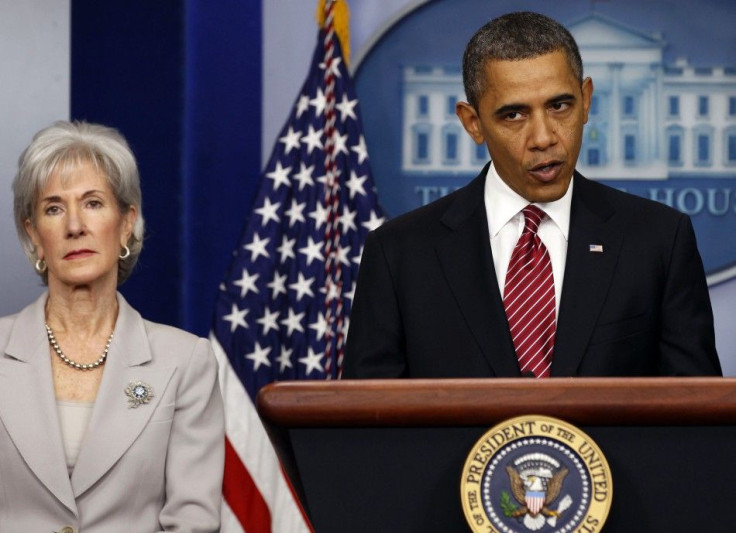President's Birth-Control Plan Goes Unblessed by U.S. Catholic Bishops

U.S. Catholic Church leaders said they will fight President Barack Obama's controversial birth-control insurance-coverage policy despite his compromise that religious employers would not have to offer free contraceptives for workers, shifting the responsibility to insurers.
In an abrupt policy shift aimed at trying to end a growing election-year firestorm, Obama on Friday announced the compromise.
But the U.S. Conference of Catholic Bishops said its concerns were not addressed and cited serious moral concerns.
In a statement issued Friday evening, the bishops said Obama's proposal continues to involve needless government intrusion in the internal governance of religious institutions, and to threaten government coercion of religious people and groups to violate their most deeply held convictions.
Accordingly, We will therefore continue -- with no less vigor, no less sense of urgency -- our efforts to correct this problem through the other two branches of government, the bishops said in urging Congress to take action to overturn the rule.
The regulation at the center of the controversy requires religious-affiliated groups such as charities, hospitals, and universities -- but not churches themselves -- to provide employees with coverage for birth control as other health-insurance providers must do.
Catholic Church leaders and Obama's Republican opponents previously led the fight against the rule requiring coverage for contraceptives as a violation of religious freedom, making it a potential big issue in the 2012 presidential race.
Obama's compromise sought to accommodate religious organizations, such as Catholic hospitals and universities. But the reaction from the bishops and other Catholic leaders made clear the battle would continue.
No 'Clear Protection'
The bishops said the compromise failed to provide clear protection for many employers who might oppose birth control personally but not be classified as a religious institution, and thus be ineligible to seek exemption from the federal mandate to provide free contraception as part of every insurance package.
Under the compromise, religious employers could opt out of providing coverage, but their workers could then ask their insurance company for that benefit, and the company would be required to provide it free of charge.
In reality, the bishops suggested, that meant the employer would still in effect be subsidizing the benefit, because the insurance company would likely pay for it out of the pool of revenue it earned from its contract with the employer.
This, too, raises serious moral concerns, the bishops said.
Meanwhile, three religious groups will continue to pursue their legal challenges to the government's regulation, despite Obama's announcement, said Hannah Smith, a lawyer at the Beckett Fund for Religious Liberty, which represents the plaintiffs.
Filed by two religious colleges and a Catholic television network, the lawsuits said the government violated their constitutional rights to freedom of speech and religion. Two were filed last year, and the third was filed last week.
Initially announced on Jan. 20, the rule sparked an outcry not only from Catholic leaders but also from social conservatives, including Republican presidential hopefuls. It even drew opposition from several Democratic lawmakers.
Republicans have seized on the issue, seeking to put Obama on the defensive as signs of economic improvement appear to have re-energized his re-election bid.
Obama's compromise was aimed at preventing the controversy from becoming a liability for him with Catholic voters, while trying not to anger his liberal base.
Birth control is basic health care, and women should have access to birth control, no matter where they work, said Tait Sye, a representative of Planned Parenthood. It should not be left up to a boss's personal beliefs whether his employees should be allowed birth control coverage, he said.
'Shell Game'
Michael O'Dea, founder and executive director of Christus Medicus Foundation, a nonprofit advocacy group for religious health-care providers, said many Catholic institutions have created their own self-insurance plans to get around state regulations requiring independent insurers to provide birth control if they cover other prescription drugs.
The compromise, he said, would require those insurance plans to cover the contraception -- even if the insurers are arms of the Catholic Church. This compromise means nothing. It is nothing more than a shell game, O'Dea said.
Polls indicate most Americans -- and Catholics -- support requiring contraception coverage.
On Saturday, a group supporting expanded access to birth control released a survey showing that 57 percent of Catholic women favor the compromise set forth by Obama.
It found that 56 percent of independent Catholic voters favored the revised contraceptive coverage rule.
Among Hispanic Catholics, who could be pivotal in swing states such as New Mexico and Nevada, the poll found 59 percent supported the policy.
Commissioned by the Coalition to Protect Women's Health Care and conducted on Friday night by Public Policy Polling, the survey queried 466 Catholic voters. It had a margin of error of 4.5 percentage points.
(Additional reporting by Stephanie Simon in Denver and Terry Baynes in New York; Editing by Xavier Briand)
© Copyright Thomson Reuters 2024. All rights reserved.






















